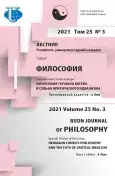Paul Ricoeur on the Recognition of Anxiety: Phenomenological Hermeneutics in Action
- Authors: Khan K.I.1,2
-
Affiliations:
- RUDN University
- National Research University “Higher School of Economics”
- Issue: Vol 25, No 3 (2021): HERMANN COHEN'S PHILOSOPHY AND THE FATE OF CRITICAL IDEALISM
- Pages: 470-482
- Section: PHENOMENOLOGY AND HERMENEUTICS
- URL: https://journal-vniispk.ru/2313-2302/article/view/325014
- DOI: https://doi.org/10.22363/2313-2302-2021-25-3-470-482
- ID: 325014
Cite item
Full Text
Abstract
The philosophical concept of anxiety, which is usually associated with Kierkegaard and Heidegger's existential philosophy, seems to be an underestimated notion in Paul Ricoeur's phenomenological hermeneutics, while its role is important - anxiety appears to serve as the grounding for hope in his hermeneutics of self. The article aims to show how the anxiety is explained in Ricoeur's philosophy through attention and recognition, and how the anxiety is reflected in the narrative forms, or descriptions of vivencia . These descriptions may be seen as the verbal explanation of the so-called affective niche or affective scaffolding , which is a form of cultural adaptation, attempting to interpret and comprehend one's state of mind and way of the perception of the world as such in the given moment. The research and further dialogue based on these narrations may become an important source to recover from anxiety disorder, by discovering its existential meaning and, at the same time, accepting personal responsibility for it. Ricoeur's phenomenological hermeneutics made an important theoretical contribution in understanding the essential aspects of anxiety and hope; but it also developed prolific methods of interpretation, that could be practically applied in health care and psychotherapy; these can be shown on the example of the psychotherapeutic method of the usage of so-called 'anxiety protocols', which aim to arrange the hermeneutical co-research to help patient/client to recognize and overcome its anxiety disorders.
About the authors
Kate Innokentievna Khan
RUDN University; National Research University “Higher School of Economics”
Author for correspondence.
Email: khan-ei@rudn.ru
assistant lecturer, RUDN University, Chair of Ontology and Epistemology; PhD student, National Research University “Higher School of Economics”, School of Philosophy and Cultural Studies, Faculty of Humanities
Miklukho-Maklaya St., 6, Moscow, 117198, Russian Federation; 20, Myasnitskaya St., Moscow, 101000, Russian FederationReferences
- Rilke RM. I am, O Anxious One. Don't you hear my voice… (from the Book of Hours, 1905). In The Selected Poetry of Rainer Maria Rilke. Mitchell S, editor, translator. New York: Random House; 1982.
- Ricoeur P. The Conflict of Interpretations: Essays in Hermeneutics. Evanston, IL: Northwestern University Press; 1974.
- Ricoeur P. On Interpretation. In From Text to Action. Essays in Hermeneutics II. Evanston, IL: Northwestern University Press; 1991.
- Krueger J, Osler L. Engineering Affect: Emotion Regulation, the Internet, and the Techno-Social Niche. Philosophical topics. Fall 2019;47(2):205-231. doi: 10.5840/philtopics201947223.
- Laland KN, Odling-Smee J, Feldman MW. Niche Construction, Biological Evolution, and Cultural Change. Behavioral and Brain Sciences. 2000;23(1):131-146. doi: 10.1017/S0140525X00002417
- Colombetti G, Krueger J. Scaffoldings of the Affective Mind. Philosophical Psychology. 2015;28(8):1-20. doi: http://dx.doi.org/10.1080/09515089.2014.976334
- Simonÿ Ch, Specht K, Andersen ICh, Johansen KK, Nielsen Ch, & Agerskov H. A Ricoeur-inspired approach to interpret participant observations and interviews. Global Qualitative Nursing Research. 2018. 5: 233339361880739. [Published online: 30.10.2018]. doi: 10.1177/2333393618807395.
- Simonÿ Ch, Andersen ICh, Bodtger U & Birkelund R. Breathing through a troubled life - a phenomenological-hermeneutic study of chronic obstructive pulmonary disease patients' lived experiences during the course of pulmonary rehabilitation. International Journal of Qualitative Studies on Health and Well-being. 2019;14(1). [Published online: 21.08.2019]. doi: 10.1080/17482631.2019.1647401.
- Singsuriya P. Nursing researchers' modifications of Ricoeur's hermeneutic phenomenology. Nursing Inquiry. 2015;22:348-358. doi: 10.1111/nin.12098.
- DeCastro A. Proceso experiencial en psicoterapia existencial. In Gomez Salas R, editor. Relación psicoterapéutica. Enfoque fenomenológico-existencial. Lima, Peru: Fondo Editorial de la UIGV; 2013. P. 33-58
- Ricoeur P. Philosophical anthropology. Cambridge; Malden: Polity Press; 2016.
- Freud S. On the grounds for detaching a particular syndrome from neurasthenia under the description 'Anxiety Neurosis' (J. Strachey, Trans.). In Strachey J, editor. Early psycho-analytic publications. Vol. 3. P. 87-139. London: The Hogath Press; (1953) 1975.
- Ricoeur P. History and Truth. Evanston, IL: Northwestern University Press; 1965.
- Heidegger M. What Is Metaphysics? In Pathmarks. [McNeill W, editor; Krell DF, translator]. Cambridge University Press; 1998.
- Ricoeur P. Vraie et fausse angoisse. (Conférence du 3 septembre). L'angoisse du temps présent et les devoirs de l'esprit. Textes des conférences et des entretiens organisés par les Rencontres Internationales de Genève. Neuchâtel, Les Éditions de la Baconnière; 1953.
- Abel O, Porée J. Le Vocabulaire de Paul Ricoeur. Paris : Ellipses Édition Marketing S.A.; 2007.
- Huskey R. Paul Ricoeur on hope: expecting the good. Phenomenology and literature, vol. 6. New York: Peter Lang Publishing Inc.; 2009.
- Vanhoozer KJ. The Joy of Yes: Ricoeur: Philosopher of Hope. The Christian Century. August 23, 2005. URL: https://www.christiancentury.org/article/2005-08/joy-yes.
- Maes M. Hope, hermeneutics and eschatology. Based on the philosophy of Paul Ricœur. [Conference paper]. Conference: Ecumenical Reception and Critique of Twentieth-Century Orthodox Theology in Exile and Diaspora. Prague; 2015.
- Ricoeur P. Living up to Death. Translated by D. Pellauer. The University of Chicago Press; 2009.
- Ricoeur P. The Course of Recognition. [D. Pellauer, translator]. Cambridge, Massachusetts: Harvard University Press; 2005.
- López-Ibor JJ, López-Ibor MI. Anxiety and logos: toward a linguistic analysis of the origins of human thinking. Journal of Affective Disorders. 2009;120(1-3):1-11. doi: 10.1016/j.jad.2009.02.026.
- De Castro A. Hermeneutical understanding of an experience of being anxious. Qualitative Research in Psychology. 2005;2(2):141-167. doi: 10.1191/1478088705qp034oa.
- Simonÿ Ch, Dreyer P, Pedersen BD, Birkelund R. Empowered to gain a new foothold in life-A study of the meaning of participating in cardiac rehabilitation to patients afflicted by a minor heart attack. International Journal of Qualitative Studies on Health and Well-being. 2015;10 (1):28717. doi: 10.3402/qhw.v10.28717.
Supplementary files









